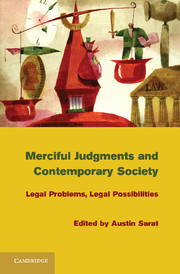Book contents
- Frontmatter
- Contents
- Acknowledgments
- Contributors
- When Can or Should Legal Judgment Be Merciful? An Introduction
- 1 The Place of Mercy in Legal Discourse
- Commentary on Chapter 1
- 2 Mercy, Crime Control, and Moral Credibility
- Commentary on Chapter 2
- 3 Defending a Role for Mercy in a Criminal Justice System
- Commentary on Chapter 3
- 4 Actions of Mercy
- Commentary on Chapter 4
- 5 A Feminist View of Mercy, Judgment, and the “Exception” in the Context of Transitional Justice
- Commentary on Chapter 5
- Index
- References
Commentary on Chapter 4
Reflections on “Actions of Mercy”
Published online by Cambridge University Press: 05 December 2011
- Frontmatter
- Contents
- Acknowledgments
- Contributors
- When Can or Should Legal Judgment Be Merciful? An Introduction
- 1 The Place of Mercy in Legal Discourse
- Commentary on Chapter 1
- 2 Mercy, Crime Control, and Moral Credibility
- Commentary on Chapter 2
- 3 Defending a Role for Mercy in a Criminal Justice System
- Commentary on Chapter 3
- 4 Actions of Mercy
- Commentary on Chapter 4
- 5 A Feminist View of Mercy, Judgment, and the “Exception” in the Context of Transitional Justice
- Commentary on Chapter 5
- Index
- References
Summary
He hath shewed thee, O man, what is good: and what doth the Lord require of thee, but to do justly, and love mercy, and to walk humbly with thy God.
– Micah 6:8Alice Ristroph's work explores theories and ideas about justice and punishment and whether there is any room for a consideration of mercy. Underlying much of the discussion is the notion that the exercise of mercy indicates a failure of the first principles and values that support a regime where justice demands punishment. The theorists suggest that mercy is counterproductive, illegitimate, and hurtful to the victim and ultimately destructive to a well-ordered society. However, the concept of mercy is not discounted by Ristroph, and indeed she considers how the theorists sidle up to mercy even as they explore the justification for punishment. In thinking about mercy, she asks how mercy can answer some of the critiques of the theorists and what mercy might look like as a necessary component to a legitimate system of punishment, and whether one actually has to have experienced mercy to thoughtfully understand its place in a system of justice where punishment is a necessary component.
- Type
- Chapter
- Information
- Merciful Judgments and Contemporary SocietyLegal Problems, Legal Possibilities, pp. 234 - 246Publisher: Cambridge University PressPrint publication year: 2011



